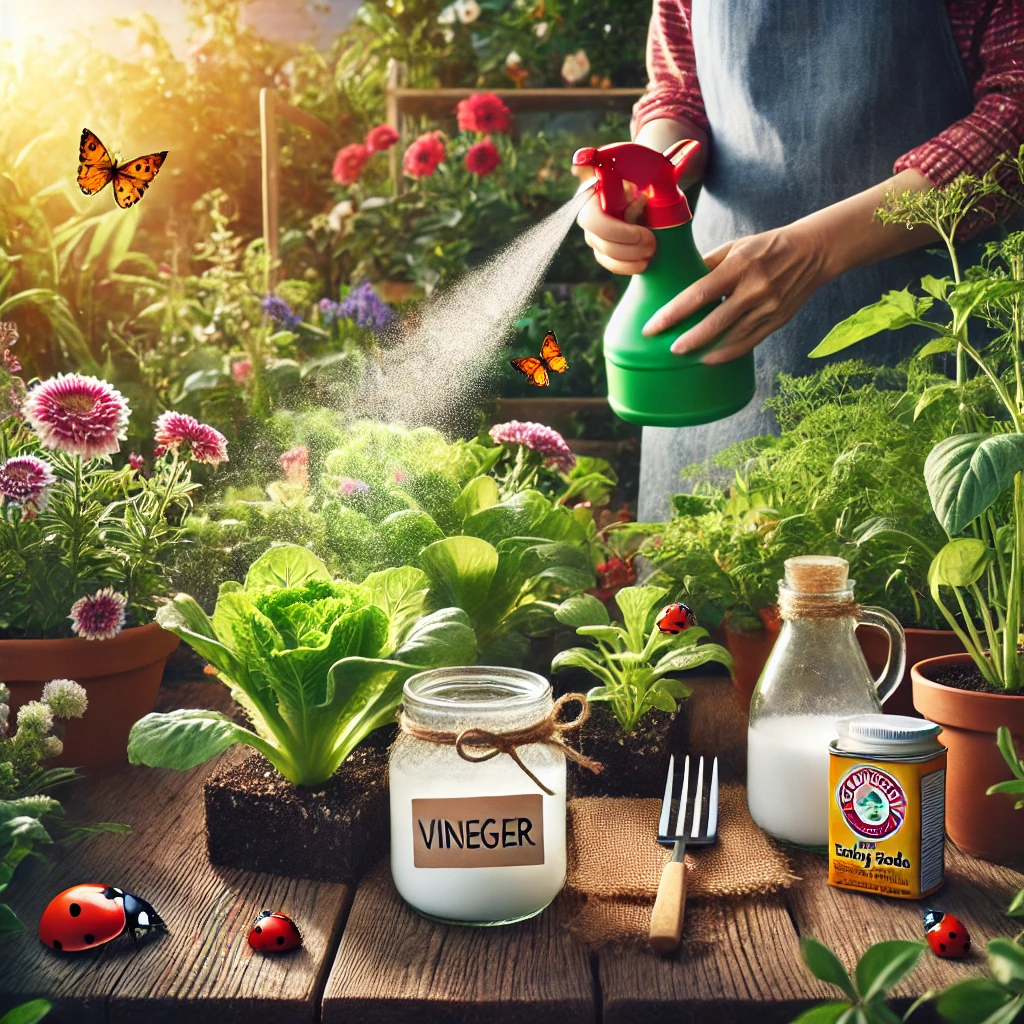Vinegar, baking soda and essential oils are versatile, eco-friendly ingredients that can be used to natural pest control in your garden. These household items can be combined into effective sprays and traps to manage common garden invaders like aphids, slugs and spider mites without harsh chemicals.
As a horticulturist with a passion for sustainable gardening, I’m excited to share some of my favorite natural pest control methods using simple, inexpensive ingredients you likely have at home. Protecting your garden doesn’t have to mean resorting to harsh pesticides – let’s explore how you can harness the power of nature to keep pests at bay.
Vinegar-Based Pest Control

Aphid Spray
- Mix 1 part white vinegar to 3 parts water in a spray bottle
- Spray directly on aphids and infested plant areas
- The acetic acid in vinegar acts as a natural insecticide
For more information on using vinegar for aphid control, check out this article from the University of Georgia Extension.
Slug and Snail Repellent
- Create a barrier of vinegar around plants susceptible to slug/snail damage
- The acidic vinegar deters these pests from crossing the barrier
- Reapply after rain or heavy watering
Learn more about using vinegar for slug and snail control from the Missouri Botanical Garden.
Baking Soda for Pest Management
Powdery Mildew Treatment
- Mix 1 tablespoon of baking soda per 1 cup of water
- Spray affected plants to inhibit the growth of powdery mildew
- The alkaline properties of baking soda disrupt the fungus
For a deeper dive into using baking soda against powdery mildew, check out this guide from the University of California Master Gardeners.
Ant Deterrent
- Sprinkle baking soda around ant hills and entry points
- The abrasive nature of baking soda disrupts the ants’ trails
- Reapply after rain or watering
Learn more about using baking soda for ant control from the Texas A&M AgriLife Extension.
Essential Oils for Pest Control
Spider Mite Spray
- Mix 10-15 drops of peppermint or rosemary oil per 1 cup of water
- Spray directly on infested plants
- The strong scents repel and disrupt spider mites
For a comprehensive guide on using essential oils for spider mite control, visit this article from the University of Florida IFAS Extension.
Flea Beetle Deterrent
- Create a spray with 10 drops of lemongrass or eucalyptus oil per 1 cup of water
- Mist directly on vulnerable plants
- The strong odors discourage flea beetles from feeding
Learn more about using essential oils for flea beetle management from the University of Maine Cooperative Extension.
Homemade Pest Traps
Fruit Fly Trap
- Fill a jar with apple cider vinegar and a few drops of dish soap
- The vinegar attracts the flies, and the soap traps them
For detailed instructions on making a fruit fly trap, check out this guide from the University of Nebraska-Lincoln Extension.
Slug and Snail Trap
- Bury a shallow container filled with beer or a yeast-sugar solution
- The fermented aroma lures slugs and snails, who then drown
Learn more about DIY slug and snail traps from the Oregon State University Extension.
Tips for Effective Natural Pest Control
- Apply treatments early in the morning or evening to avoid evaporation
- Reapply sprays and refresh traps as needed, especially after rain
- Combine multiple methods for better pest management
For more information on integrated pest management in the home garden, visit the University of Illinois Extension.
Harnessing the power of natural ingredients like vinegar, baking soda, and essential oils can be an effective, eco-friendly way to manage pests in your garden. These household items offer a safe alternative to harsh chemical pesticides while still providing reliable protection for your plants. By incorporating these simple, DIY solutions, you can create a healthier, more sustainable garden environment. Happy pest-free gardening!
For additional resources on organic pest control, check out the National Pesticide Information Center.